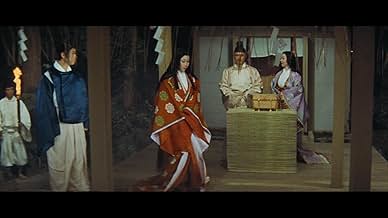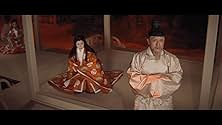Koiya Koi Nasuna Koi is internationally known as Love, Thy Name Be Sorrow or as The Mad Fox. This movie was made by Uchida Tomu, who has been making several remarkable period dramas known as jidaigeki. This particular movie is based upon a puppet theatre play, also known as a bunraku play, from the early eighteenth century. This is the reason why the movie includes several elements of theatre play such as pieces of scenery, singing performances and stages. Artistically, intellectually and visually, this movie is certainly unique and might need some time to properly unfold.
The story is quite complex, epic and traditional. It revolves around renowned fortune-teller Kamo no Yasunori who is murdered in a plot planned by his devious wife and his jealous former student. His faithful disciple and his adopted daughter get blamed for this vicious crime. She gets tortured to death while he manages to escape, murders the pitiless widow of the deceased fortune-teller and steals the oracle scroll. Maddened by the tragical series of events, the faithful disciple wanders Japan until he meets the twin sister of the murderer adopted daughter. Mistaking her for the deceased lady, he decides to settle with her. The jealous former student has however mobilized troops to find and assassinate the maddened disciple and reclaim the oracle scroll. As the troops are hunting the faithful disciple and his lover, a fox lady gets severely injured. The disciple saves her life and brings the kitsune to her husband and her granddaughter who falls in love with the disciple. On their way back home, the disciple and his lover get attacked and separated by the troops. The fox people intervene, save their lives and retrieve the oracle scroll. The granddaughter takes the appearance of the disciple's lover, nurses him back to health and established a family with him. A dramatic turn of events occurs when the faithful disciple regains his sanity and understands that he has been tricked more than once.
This film convinces on multiple layers. First and foremost, the influences of traditional Japanese theatre plays make this film creative, diversified and unique. The folkloristic elements ranging from characters over costumes to locations add much depth to the movie. The detailed, diversified and profound story challenges viewers on an emotional and intellectual level.
However, this film also has a few minor downsides. Its intellectual style might be difficult to approach not only for foreign audiences but also for contemporary Japanese viewers. This film at times includes too many ideas instead of fleshing out a few essential points. The settings look cheap and haven't aged particularly well. The singing performances that increase by the movie's resolution sound nerve-firing.
At the end of the day, Koiya Koi Nasuna Koi is a movie that deserves to be explored by cineasts who like to think outside the box. The combination of folklore, musical and theatre elements make this romantic drama one of a kind. Viewers however need an open mind and a lot of patience to appreciate this film for what it is. This movie is best enjoyed on your own on a rainy night but nothing to be watched with family members or friends in a joyful and light-hearted setting.























